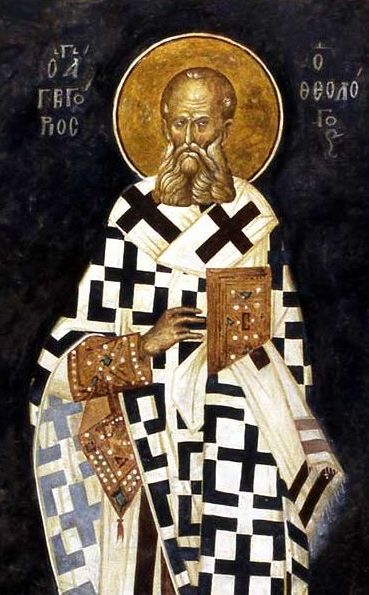Gregory of Nazianzus was a 4th century bishop from Cappadocia who eventually became the Archbishop of Constantinople. Together with the brothers Basil the Great and Gregory of Nyssa they were known as the Cappodocian Fathers. Basil, Nazianzus, and John Chrysostom are known collectively as the Three Holy Heirarchs, the Eastern Church’s version of the Four Great Doctors (Augustine, Ambrose, Gregory the Great, and Jerome). Gregory briefly presided over the Council of Constantinople (which gave us the Nicene Creed) and is responsible for the Trinitarian language we use about the Holy Spirit, the language of “three persons” (hypostases) of the Trinity, and in articulating Christology in the face of Apollinarianism. In other words, he was kind of a big deal.
It is to Gregory’s defense of the full humanity of Christ against the heresy of Apollinaris that I now turn. Apollinarianism was a heresy that taught that while Jesus had a human body, he did not possess a human mind. What’s the big deal, you ask? He’s still divine. Well, Gregory of Nazianzus would have none of that. In his Epistle 101 he eloquently articulates why it is important that Jesus Christ possesses a human mind. In this section he bequeaths to the church this important theological maxim that you should commit to memory: what has not been assumed has not been healed. Here’s the conclusion to his letter.
If anyone has put his trust in Him as a Man without a human mind, he is really bereft of mind, and quite unworthy of salvation. For that which He has not assumed He has not healed; but that which is united to His Godhead is also saved. If only half Adam fell, then that which Christ assumes and saves may be half also; but if the whole of his nature fell, it must be united to the whole nature of Him that was begotten, and so be saved as a whole. Let them not, then, begrudge us our complete salvation, or clothe the Saviour only with bones and nerves and the portraiture of humanity.
Gregory of Nazianzus, Epistle 101, 4th c. A.D.
Three things stick out from this quote. First of all is the Eastern notion that the incarnation itself, God uniting with humanity in the person of Jesus Christ, is the source of our salvation. Of course, the atoning work of the cross to gain the forgiveness of our sins was necessary, but this notion of the hypostatic union- that humanity and divinity are inseparably united together in Christ and by the very force of that union we find the source of the righting of our broken humanity- this is key aspect of our salvation as well. Thus, Gregory reasoned, if Christ was not fully human, we are not fully saved. If he did not have a human mind, as Apollinaris taught, then our minds are not healed. But if our minds are fallen, then we need our minds to be redeemed. Who among us who has suffered from depression, anxiety, or other disabilities that with modern science we know are afflictions of the mind would not agree that our minds are fallen and in need of healing? Since our minds are fallen we need a Jesus with a human mind, to heal our minds by the union of broken humanity with the divine.
Further, if our wills are fallen or our emotions, or any other non-tangible aspect of our inner-selves, then Jesus had to have a human one of those too. Otherwise we are not fully redeemed.
Secondly, we have in this quote something that looks an awful lot like the Calvinistic idea of radical depravity. Gregory’s syllogism requires belief in the notion that every aspect of humanity is fallen and in need of redemption. He writes, “If only half Adam fell, then that which Christ assumes and saves may be half also; but if the whole of his nature fell, it must be united to the whole nature of Him that was begotten, and so be saved as a whole.” The whole of his nature fell, including the parts that make decisions, the will, and enable a person to respond to the gospel call by faith. That looks like radical depravity to me.
And that leads to the third notion in the quote that so powerfully resonates: the idea that we are saved to the uttermost. It’s not just that our souls are rescued to escape eternal punishment. No, all of who we are, every aspect of who we are as humans is saved because every aspect of our fallen humanity was united to the Godhead in the person of Jesus Christ. In that humanity he perfectly obeyed and pleased the father, was crucified to pay the debt we could never repay, was raised again as the first-fruits of our resurrection, was glorified into a new incorruptible, impeccable humanity that we will all one day possess, and was raised into the heavens where a fully human person sits at the right hand of the Father ruling over all things and sustaining all things with his powerful word.
That is salvation. Do not begrudge us any little bit of it. For if any part of Jesus’ humanity wasn’t really human, if he wasn’t truly consubstantial with us in his humanity, then we aren’t completely saved. What has not been assumed has not been healed. Let them not, then, begrudge us our complete salvation, or clothe the Savior only with bones and nerves and the portraiture of humanity.

